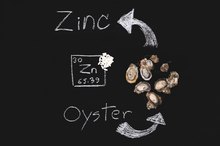What does fact checked mean?
At Healthfully, we strive to deliver objective content that is accurate and up-to-date. Our team periodically reviews articles in order to ensure content quality. The sources cited below consist of evidence from peer-reviewed journals, prominent medical organizations, academic associations, and government data.
- "Journal of Dermatological Treatment"; Zinc in Skin Pathology and Care; Y. Bibi Nitzan and A.D. Cohen; 2006
- "Journal of Dermatological Treatment"; Zinc in Skin Pathology and Care; Y. Bibi Nitzan and A.D. Cohen; 2006
- "Dermatologic Surgery"; Zinc and Skin Health: Overview of Physiology and Pharmacology; J.R. Schwartz, et al.; July 2005
- "Dermatologic Surgery"; Zinc and Skin Health: Overview of Physiology and Pharmacology; J.R. Schwartz, et al.; July 2005
- Office of Dietary Supplements of the National Institutes of Health: Zinc
- MedlinePlus: Seborrheic Dermatitis; Kevin Derman, et al.; July 2007
The information contained on this site is for informational purposes only, and should not be used as a substitute for the advice of a professional health care provider. Please check with the appropriate physician regarding health questions and concerns. Although we strive to deliver accurate and up-to-date information, no guarantee to that effect is made.
Seborrheic Dermatitis & Zinc
Zinc is a highly versatile nutrient that is required in small amounts by the human body to maintain good health. Additionally, zinc has many medicinal properties, including anti-inflammatory and antimicrobial effects. Among the myriad medicinal uses of zinc is treatment of seborrheic dermatitis, a skin condition that commonly causes dandruff. Like any alternative medicine, consult your doctor before attempting to treat seborrheic dermatitis with zinc.
Seborrheic Dermatitis
Seborrheic dermatitis is a poorly understood skin condition that causes a variety of symptoms, including patches of skin that may become dry and flaky or yellowish and oily, explains MedlinePlus 4. Although seborrheic dermatitis can occur on many different body parts, it is most common on oily areas of skin, such as:
- the scalp
- ears
- eyebrows
- eyelids
- lips
- nose
In severe cases, seborrheic dermatitis can lead to red, inflamed skin, itching and skin lesions.
Causes
Skin Rashes & Zinc
Learn More
The exact cause of seborrheic dermatitis is not well understood. Doctors theorize that it may be caused by a combination of irritation from a yeast known as malessizia and production of excess oil by the skin. The condition tends to run in families and is often triggered by fatigue, extreme weather, stress, obesity and certain lotions. When seborrheic dermatitis occurs on the scalp, it commonly causes dandruff.
- The exact cause of seborrheic dermatitis is not well understood.
- When seborrheic dermatitis occurs on the scalp, it commonly causes dandruff.
Zinc and Seborrheic Dermatitis
Zinc, often in the form of shampoos containing zinc pyrithione, is a common treatment for seborrheic dermatitis. The results of many clinical studies suggest that zinc pyrithione is an effective treatment for dandruff and seborrheic dermatitis, reports a review of zinc research published in 2006 in the "Journal of Dermatologic Treatment." Although zinc pyrithione is effective in reducing the symptoms of seborrheic dermatitis, other shampoos containing a chemical known as ketoconazole may be more effective.
Mechanism
What Are the Benefits of Zinc Gluconate for Skin?
Learn More
Exactly how zinc treats seborrheic dermatitis is a subject of debate. Part of the beneficial effect seems to involve zinc directly inhibiting the growth the malessizia, the yeast that contributes to seborrheic dermatitis. Zinc may also treat the symptoms by reducing the inflammation of skin cells known as keratinocyte, reports a study published in the July 2005 issue of the medical journal "Dermatological Surgery"; however, this claim requires addition proof.
Related Articles
References
- "Journal of Dermatological Treatment"; Zinc in Skin Pathology and Care; Y. Bibi Nitzan and A.D. Cohen; 2006
- "Dermatologic Surgery"; Zinc and Skin Health: Overview of Physiology and Pharmacology; J.R. Schwartz, et al.; July 2005
- Office of Dietary Supplements of the National Institutes of Health: Zinc
- MedlinePlus: Seborrheic Dermatitis; Kevin Derman, et al.; July 2007
- Tucker D, Masood S. Seborrheic dermatitis. In: StatPearls Publishing. Updated December 28, 2019.
- Borda LJ, Wikramanayake TC. Seborrheic dermatitis and dandruff: A comprehensive review. J Clin Investig Dermatol. 2015;3(2):10.13188/2373-1044.1000019. doi:10.13188/2373-1044.1000019
- Thayikkannu AB, Kindo AJ, Veeraraghavan M. Malassezia—Can it be ignored?. Indian J Dermatol. 2015;60(4):332-9. doi:10.4103/0019-5154.160475
- Tamer F, Yuksel ME, Sarifakioglu E, Karabag Y. Staphylococcus aureus is the most common bacterial agent of the skin flora of patients with seborrheic dermatitis. Dermatol Pract Concept. 2018 Apr;8(2):80-4. doi:10.5826/dpc.0802a04
- Karakadze MA, Hirt PA, Wikramanayake TC. The genetic basis of seborrhoeic dermatitis: a review. J Eur Acad Dermatol Venereol. 2018;32(4):529-36. doi:10.1111/jdv.14704
- Motswaledi MH, Visser W. The spectrum of HIV-associated infective and inflammatory dermatoses in pigmented skin. Dermatol Clin. 2014;32:211-25. doi:10.1016/j.det.2013.12.006
- Savoia P, Cavaliere G, Zavattaro E, Veronese F, Fava P. Inflammatory cutaneous diseases in renal transplant recipients. Int J Mol Sci. 2016;17(8):1362. doi:10.3390/ijms17081362
- Clark GW, Pope SM, Jaboori KA. Diagnosis and treatment of seborrheic dermatitis. Am Fam Physician. 2015 Feb 1;91(3):185-90.
- McLoone P, Warnock M, Fyfe L. Honey: A realistic antimicrobial for disorders of the skin. J Microbiol Immunol Infect. 2016 Apr;49(2):161-7. doi:10.1016/j.jmii.2015.01.009
- Takagi Y, Ning X, Takahashi A, et al. The efficacy of a pseudo-ceramide and eucalyptus extract containing lotion on dry scalp skin. Clin Cosmet Investig Dermatol. 2018;11:141-8. doi:10.2147/CCID.S158428
- Dobler D, Schmidts T, Wildenhain S, Seewald I, Merzhäuser M, Runkel F. Impact of selected cosmetic ingredients on common microorganisms on healthy human skin. Cosmetics. 2019;6(45):1-13. doi:10.3390/cosmetics6030045
- National Psoriasis Foundation. What's tops in topical steroid treatments?. Updated August 14, 2019.
- U.S. Food and Drug Administration. FDA approves updated labeling with boxed warning and medication guide for two eczema drugs, Elidel and Protopic. January 19, 2006.
- De Souza Leão Kamamoto C, Sanudo A, Hassun KM, Bagatin E. Low-dose oral isotretinoin for moderate to severe seborrhea and seborrheic dermatitis: a randomized comparative trial. Int J Dermatol. 2017;56(1):80-5. doi:10.1111/ijd.13408
- Altman K, Vanness E, Westergaard RP. Cutaneous manifestations of human immunodeficiency virus: a clinical update. Curr Infect Dis Rep. 2015;17(3):464. doi:10.1007/s11908-015-0464-y
- Suárez AL, Feramisco JD, Koo J, Steinhoff M. Psychoneuroimmunology of psychological stress and atopic dermatitis: Pathophysiologic and therapeutic updates. Acta Derm Venereol. 2012;92(1):7–15. doi:10.2340/00015555-1188
Writer Bio
Matthew Busse has pursued professional health and science writing since 2007, writing for national publications including "Science Magazine," "New Scientist" and "The Scientist." Busse holds a doctorate in molecular biology from the University of California-San Diego.









